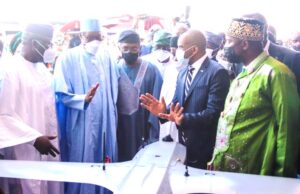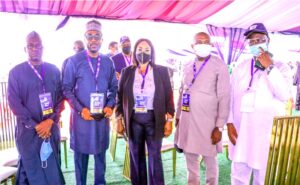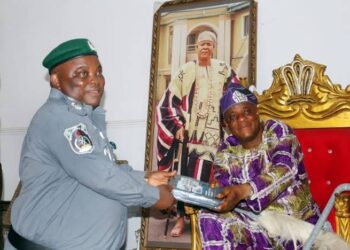President Muhammadu Buhari said the Integrated National Security and Waterways Protection Infrastructure Project, also known as the Deep Blue project, was the benchmark for maritime security in the West and Central African region.

President Muhammadu Buhari said this on Thursday while inaugurating the much-anticipated maritime assets at the ENL Terminal Apapa Port, Lagos.
He added that the project would facilitate a conducive environment for the maritime sector to thrive and contribute to the diversification of the Nigerian economy.
This is even as he informed that the Federal Government has secured 10 convictions for various maritime offences since the Suppression of Piracy and other Maritime Offences (SPOMO)Act that was signed into law in June 2019
The President disclosed this at the official flag-off of the Integrated National Security and Waterways Protection Infrastructure in Nigeria also known as the Deep Blue Project
Buhari expressed confidence that the project will provide a robust maritime security architecture that will enhance the nation’s maritime domain awareness.
He said: ‘‘I am confident that the project, which provides a robust maritime security architecture, will enhance maritime domain awareness capability and improve law enforcement action, particularly in the prosecution of suspects under the Suppression of Piracy and other Maritime Offences Act which I signed into law in June 2019.
‘‘This Flag-off is an important step in the continuing shift in strategic action about regional maritime security.
Read Also: Rail Network To Make Nigeria’s Ports Destination For Import, Export—- Buhari
‘‘It will serve as a benchmark for member states in the Gulf of Guinea and other relevant stakeholders to further develop innovative strategies and align efforts with the subsisting framework to improve maritime security in the region,’’ he said.
Calling for greater collaboration among countries in the Gulf of Guinea to secure Nigeria’s waters and beyond, President Buhari noted that the assemblage of the new maritime security assets was coming at a critical time when global discussions are centered on piracy activities and the new dimension it has taken in the region.
‘‘With the world’s waters accounting for over 80% of transportation requirements of the global economy, concerted efforts and innovative actions are required to address attendant security challenges.
‘‘Therefore, the flag-off of the project marks an important milestone in this regard and in our collective effort to tackle security challenges in the form of piracy and other maritime crimes in Nigeria and the Gulf of Guinea. It is also a demonstration of government’s strong commitment to ensuring security.
‘‘This intervention, no doubt, will facilitate a conducive environment for the maritime sector to thrive and contribute to the diversification of the Nigerian economy,’’ he said.
The President commended the Ministers of Transportation and Defence, as well as the Chief of Naval Staff, the Director-General NIMASA, members of the Steering Committee, the Project Management Team and all government stakeholders who have worked together to bring this initiative of the administration to fruition.
Assuring of government’s commitment to ensure the project’s sustainability, the President urged all critical stakeholders to work collectively for the greater benefit of all Nigerians, member states of the Gulf of Guinea and the global maritime community.

At the inauguration, the President, who witnessed the demonstration of a range of assets to tackle maritime security, supervised the naming of two Vessels, Deep Blue Abuja (DB-Abuja) and Deep Blue Lagos (DB-Lagos) by the Minister of State, Transportation, Senator Gbemisola Saraki.
Speaking earlier the Minister of Transportation, Rotimi Amaechi,said the project was a dream come true, because he faced several oppositions in the course of actualising the project, including some elites in the system who he alleged have been making money from the insecurity menace.
Amaechi informed that the facilities comprise of four components – marine assets; aerial assets; land assets and the Command Control Computer Communication intelligence (C4i).
He said they are huge in cost and very sensitive assets which must be properly serviced and maintained.
On his part, the Minister of Defence, Major General (rtd) Bashir Magashi, stated that with the Deep Blue Project, safety was guaranteed in the maritime sector and this would attract Foreign Direct Investments (FDIs) in maritime.
He described the C4i intelligence centre as the heart of the project, adding that with the operation of C4i and the entire project, piracy in the nation’s exclusive economic zone (EEZ) and the entire maritime space would be addressed.
Magashi stressed the need to make judicious use of the assets of the Deep Blue project and advised that proper maintenance be provided to ensure the benefits of the project were fully optimised.
Earlier in his welcome address, Director-General, Nigerian Maritime Administration and Safety Agency (NIMASA), Dr, Bashir Jamoh described the deep blue project as “mission accomplished”.
Jamoh, had earlier said the project, which was initiated by the Federal Ministry of Transportation and Federal Ministry of Defence, was being implemented by NIMASA.
He said with the deployment of the assets of the Deep Blue Project, the country had entered another level of national security designed for total spectrum maritime security and better domain awareness, using some of the latest technology.
“This effort to secure our waters will give Nigerians more leverage to harness the enormous resources of our maritime environment and aid the drive toward economic diversification,” he said.
According to him, the main objective of the Deep Blue Project is to secure Nigerian waters up to the Gulf of Guinea, and that the project has three platforms to tackle maritime security on land, sea and air.
The land assets include the Command, Control, Communication, Computer, and Intelligence Centre (C4i) for intelligence gathering and data collection.
“16 armoured vehicles for coastal patrol; and 600 specially trained troops for interdiction, known as Maritime Security Unit. The sea assets are two Special Mission Vessels and 17 Fast Interceptor Boats.
“The air assets comprise two Special Mission Aircraft for surveillance of the countrys Exclusive Economic Zone; three Special Mission Helicopters for search and rescue operations; and four Unmanned Aerial Vehicles.
“The Deep Blue Project is the first integrated maritime security strategy in West and Central Africa with the aim of tackling the incidences of piracy, sea robbery and other crimes at sea,” he said.
Jamoh said the Suppression of Piracy and Other Maritime Offences Act passed by the ninth National Assembly would now provide legal backing for prosecution and punishment of offenders which used to be a challenge.
He noted that the project was aimed at ensuring safer waterways so that businesses can thrive and ultimate boost the national economy.
While applauding President Buhari for signing the Anti-Piracy bill into law, he also stated that the law has convicted about 10 offenders for the first time.
According to him, NIMASA is working closely with international community to curtail criminality in the nation’s exclusive economic zone.
He said pirate attacks have reduced from mid-February this year, urging the shipping firms to review the war risk insurance to Nigeria.
















Discussion about this post